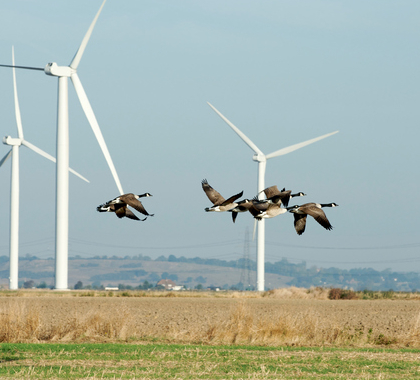The Maryland state legislature overrode Gov. Larry Hogan’s (R) veto of a bill to raise and accelerate mandated increases in the use of renewable energy in the state.
Under Maryland’s prior renewable energy mandate, 20 percent of the electricity provided by the state’s utilities had to come from renewable-energy sources by 2022. The new law increases and expedites the amount of renewable energy utilities have to provide, mandating 25 percent of the electricity they sell comes from renewable sources by 2020.
Paying More for Energy
Hogan vetoed the law in May 2016, calling it a “sunshine tax” that would cost ratepayers more than $100 million.
The legislation overriding Hogan’s veto passed the Senate by a vote of 32 to 13 on February 2, having passed the House by a vote of 88 to 51 earlier in the week.
Hogan posted on his Facebook page a list of the senators who voted for the override, writing the new requirement will “place yet another burden on ratepayers and taxpayers. It will be an additional charge on your energy bill each month to pay for overly expensive solar and wind energy credits, the majority of which are created by companies outside of Maryland.”
John Eick, director of the American Legislative Exchange Council’s Energy, Environment, and Agriculture Task Force, says the expanded renewable mandates will raise energy costs and do nothing to prevent climate change.
“As Gov. Hogan has said, increasing the state’s renewable energy mandate is tantamount to a tax increase levied upon every single ratepayer in Maryland,” said Eick. “More than that, it’s bad policy to continue distorting electricity markets in a way that picks winners and losers.
“Also, if it is the goal of the Maryland General Assembly to reduce levels of greenhouse gas emissions from their electricity sector, this sort of unilateral policy will have an absolutely negligible impact on the climate,” Eick said.
High Costs, Negligible Benefits
James Taylor, president of the Spark of Freedom Foundation, says there are more-affordable, environmentally friendly ways to produce electric power than mandating companies buy more wind and solar power.
“The bill requires most of the renewable power mandate to be met through more-expensive sources such as wind and solar power,” Taylor said. “If Maryland lawmakers wish to reduce power plant emissions, they should encourage additional affordable hydro, nuclear, and natural gas power.
“From an environmental standpoint, the bill’s focus on wind power will be devastating for birds and bats in the state,” said Taylor. “Maryland’s bat population, in particular, is already under great stress, and more wind turbines will kill even more birds and bats in the future.”
Timothy Benson, a policy analyst with The Heartland Institute, publisher of Environment & Climate News, says renewable mandates burden the poor and the state’s business climate while providing few environmental benefits.
“States with renewable mandates have significantly higher energy costs than those that don’t, and low-income taxpayers and families, the people least able to afford these higher prices, are the ones who bear the biggest burden under them,” Benson said. “Renewable mandates also raise costs for job creators, resulting in higher unemployment and less overall economic activity.
“This was a terrible decision by the General Assembly, one that will have little to no environmental impact but will cause significant pain to low-income Marylanders,” said Benson.
Reducing Efficiency
Thomas A. Firey, a senior fellow with the Maryland Public Policy Institute, says renewable energy mandates are not necessarily environmentally friendly.
“In thinking about a renewable energy ‘portfolio’ requirement, it’s important not to confuse ‘renewable energy’ with environmentally sound energy,” said Firey. “One must consider the requirement’s substitution effect. Wind and solar hardly ever replace coal-fired plants because coal is used to make electricity for very different types of demand than wind or solar. Thus, it’s more likely wind and solar will replace highly efficient, low-emissions natural gas generation, which won’t result in much of an environmental gain. And the requirement encourages replacing natural gas and nuclear generation with the burning of trash, biomass, and manure, which is a big environmental loss.”
‘Bootleggers and Baptists’
Firey says the Democrat-controlled legislature’s veto override was less about preventing climate change than benefiting wealthy political donors and supporters.
“If Maryland lawmakers were serious about reducing climate change, they’d simply adopt a carbon tax, which would be much more effective at reducing emissions at significantly lower costs while producing less distortions in the market,” said Firey. “So why, instead, are Maryland lawmakers pushing this flawed idea?
“The answer has to do with a common dynamic in politics: what’s known as a ‘bootleggers and Baptists’ coalition,” Firey said. “Just like in counties in the South where the outlawing of alcoholic beverages is favored by both Baptists and bootleggers (though for very different reasons), so renewable energy requirements are advocated by high-minded but often naïve environmentalists and not-so-high-minded renewable energy companies, their Wall Street backers, and their allies in state legislatures.”
Renewable energy mandates provide customers for politically connected companies unable to compete on their own in the marketplace, Firey says.
“Portfolio standards ensure these companies and financiers a market for their costly products,” Firey said. “When you see some of the politicians involved in this standard—folks like Maryland Senate President Thomas Miller Jr. (D-Clinton) and powerful Sen. Thomas Middleton (D-Annapolis), lawmakers with histories of supporting ‘bootleggers’—you realize this is a ‘green’ policy initiative in a sense, but the green involves people’s wallets, not clean air and water.”
H. Sterling Burnett, Ph.D. ([email protected]) is a research fellow with The Heartland Institute.





